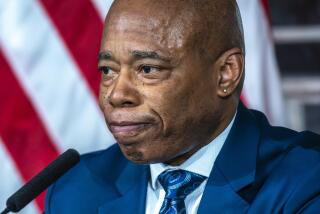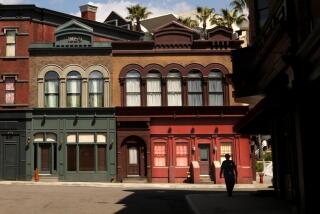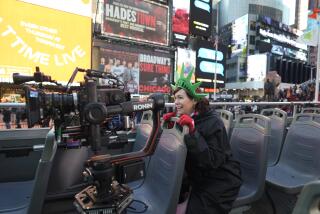Movie Project Develops Into a Legal Battle
- Share via
NEW YORK — It was a great camera angle: As he stood on a Park Avenue median in Midtown Manhattan, Indian filmmaker Rakesh Sharma saw hundreds of cars, mostly taxicabs, rushing out of a tunnel toward Grand Central Station.
Sharma was making a documentary about immigrant cab drivers, and he captured the noisy scene for about 30 minutes. Then, as he headed to Times Square for more footage, he was stopped by several New York police officers.
Why was he filming a “sensitive” landmark like the MetLife building, which towers over Grand Central? Where did he come from? Who could vouch for him?
As the exchange got heated, police detained him for two hours on the sidewalk, Sharma said.
The award-winning filmmaker, who has dark skin and a beard, said he was taken to a police precinct for more questions. Police verified his identity on the Internet, screened the footage he shot that afternoon and released him.
As Sharma was leaving, officers gave him one bit of advice: He would need to get a city permit if he wanted to continue filming on the streets of New York.
“None of this would have happened if I had been white, if I looked Caucasian,” said Sharma, 41, who filed a lawsuit last week against the city over the 2005 incident.
Sharma is also challenging the idea that he needs a permit to use a video camera to shoot footage of people and buildings as he walks through New York. His lawsuit is the first with such political overtones filed by an individual stopped for filming on city streets.
“On the day I was filming, there were many other tourists shooting scenes in the city,” he said in a phone interview from his office in Bombay, India. “They were not being bothered by anyone. They were not creating a problem for anyone.”
In the aftermath of Sept. 11, police and other public officials here have voiced repeated warnings about would-be terrorists making videotapes of sites for potential attacks.
They have told New Yorkers to be on the alert for people engaged in suspicious activities, which might include making films of schools, hospitals, tourist attractions and other locations.
During a heightened terrorism alert two years ago, Police Commissioner Raymond Kelly made specific warnings about such activity in Midtown. Police were concerned that laptops seized from suspected terrorists contained data about the number of people who passed by New York City landmarks on an hourly basis.
Last year, the New York Police Department proposed a ban on still photographs and video footage shot on the city’s subways, citing terrorism concerns. But the idea was abandoned in the face of strong public opposition and the difficulty of enforcing such a regulation.
“The bottom line is, we have an obligation to protect the people and city of New York,” said Officer Martin Speechley, with the New York Police Department’s public information office.
Speechley, who declined to discuss Sharma’s lawsuit, added: “We have a duty to check out situations if we believe someone is doing something they shouldn’t do. We’ll investigate. We’re perfectly within our rights to do that.”
Sharma said he knew that New York and other cities were worried about security and terrorism. He conceded that the police who approached him had a right to ask questions. He was stunned when the conversation turned into a conflict.
It began on a sunny afternoon in May, when he was visiting New York for a screening of his film “Final Solution,” a movie that Sharma said “documents the changing face of right-wing politics in India through a study of ethnic violence.”
The screening had been organized by Columbia University and the New School; several days earlier he had attended a showing of the film in Los Angeles. “Final Solution” has won awards at film festivals in Berlin, Hong Kong and Zanzibar, Tanzania.
Sharma said he tried to be calm when police began questioning him on Park Avenue. He gave them his passport; he offered to put them in touch with sponsors of his trip; he told them of his work; he was willing to show them his footage, Sharma said.
But it became clear, he said, that police suspected he might be shooting film for “terrorism purposes.” At one point, he added, an officer shoved him and cursed at him.
“I do believe that this was a case of [racial] profiling,” Sharma said. “But that was just the beginning. What happened after all this was also a big concern to me.”
The filmmaker said he wanted to continue shooting footage in New York, and thought that, based on what police told him, he had to seek a permit from the mayor’s office. He planned to return to the city several months later and hoped to clear the air.
“It should never have gotten to this point,” said Donna Lieberman, executive director of the New York Civil Liberties Union, which filed the lawsuit on Sharma’s behalf. “There is absolutely no reason why a person with a hand-held camera needs permission to shoot footage on the streets of New York City.”
The rules for making films in New York, administered by the mayor’s office, are spelled out on a city website. They typically apply to big-budget movies and locally produced TV shows such as “Law and Order,” but can also affect smaller projects.
All who apply for such permits are required to furnish proof of an insurance policy of at least $1 million to guard against damages.
There is no language in the guidelines, however, about filmmakers with video cameras who are working alone.
When Sharma applied for his permit, he asked for a waiver from the insurance policy, saying he could not afford it. His application was denied, Lieberman said.
“We have just received the legal papers in this case, and will evaluate them thoroughly,” said Gabriel Taussig, chief of the city’s Administrative Law Division, in a prepared statement on the police and permit issues. “Obviously, in this day and age, it’s a high priority of New York City to ensure safety on its public streets.”
Sharma said civil liberties, and their protection during a period of heightened concern over terrorism, should also be a priority for New York City officials.
If police had not interrupted him, Sharma said, he would have continued filming at the Brooklyn Bridge, in Times Square and at the site of the former World Trade Center.
“Mr. Sharma plans to be in New York City in the spring of 2006 for a screening of his films,” the lawsuit noted. “He hopes to be able to shoot footage at that time.”
More to Read
Sign up for Essential California
The most important California stories and recommendations in your inbox every morning.
You may occasionally receive promotional content from the Los Angeles Times.












